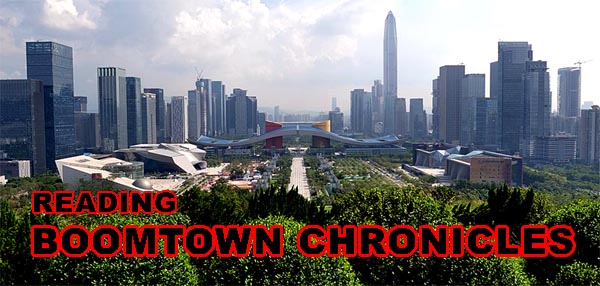 |
| Shenzhen, the Boomtown (Wikipedia) |
Note: Between Lesson #01-128 and #01-207, I wrote 72 lessons explaining expressions in articles published in the Shenzhen Daily. Read more about "Reading Boomtown Chronicles."
Get Ready: What can you do to keep from working so hard that it affects your health?
Boomtown Chronicles Part XII - published Monday, September 1, 2008 (cont.)
- Some officials had "turned a blind eye" to safety hazards.
turned a blind eye: ignored on purpose--blind by choice.
- In labor disputes, some workers "locked horns" with their employers.
locked horns: engaged in a long-term struggle. The image calls to mind a fight between two stags (male deer) or other horned animals. While competing for mates, they attack each other with their horns. If their horns get tangled, they may literally be locked together. So the expression connotes not just a fight, but a bitter one that may even lead to a stalemate.
- Excessive overtime led to a phenomenon called "karoshi."
karoshi: death from overwork. This is a Japanese word coined in the boom of Japan's 1980s "Bubble Economy," when the press noted several cases of relatively young business executives who had died of stroke, heart attack, and other stress-related diseases.
- Millions of workers were covered by a "government-run medical insurance scheme."
scheme: plan. This word and meaning are commonly used in British English but in American English, "scheme" often carries unfavorable connotations. A "scheming" co-worker or boss is trying to trick someone; however, it is neutral in expressions like the "color scheme" of room décor.
- Some workers left Shenzhen when they could "hardly call it home."
hardly: almost not. If we say, "It hardly rained yesterday," we mean it rained a very little bit. However, if it "rained hard," it rained a lot. This is interesting: usually the adverb form of an adjective takes an -ly ending: "sudden" becomes "suddenly," etc. But the usual adverb form of the adjective "hard" is "hard": "A hard worker works hard" (but a sudden storm comes suddenly). The adverb "hard" is actually the opposite of "hardly," going from a lot to a little! My dad used to ask people, "Have you been working hard, or hardly working?" (Corny and clever at the same time.)
--------
Read more: https://en.wikipedia.org/wiki/Shenzhen
Practice: Choose the correct term to fill in the blank in the sentence below:
- hardly
- karoshi
- locked horns
- scheme
- turned a blind eye
- The government committee hoped their welfare ________ would work.
- The company limited overtime, allowed plenty of days off, planned employee outings, and took other measures to avoid ________.
- The building collapsed after inspectors ________ to code violations.
- I had ________ finished my test when the examiner called, "Time's up!"
- The frustrated parent remembered how often she had ________ with her own mother when she was a teen.
Answers are in the first comment below.
Submitted to the Shenzhen Daily for September 11, 2008


Answers to the Practice: 1. d; 2. b; 3. e; 4. a; 5. c
ReplyDelete